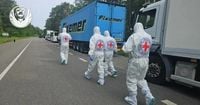In a significant development amid ongoing tensions, Russia has returned the remains of 1,212 fallen soldiers to Ukraine, marking a pivotal moment in the fragile peace process between the two nations. This exchange, confirmed by Vladimir Medinsky, Russia's chief negotiator in talks with Kyiv, is part of an agreement reached during peace negotiations held in Istanbul earlier this month.
The transfer of these remains was initially announced by Ukraine's Coordination Headquarters for the Treatment of Prisoners of War on June 11, 2025. According to the Ukrainian authorities, the soldiers had died in combat along various frontlines, including regions such as Kursk, Donetsk, Lugansk, Kherson, and Zaporizhzhia in Russia, as well as Kharkiv in Ukraine. Notably, the Ukrainian side refrained from disclosing the names or personal details of the deceased, while forensic and investigative teams from the Ministry of Internal Affairs and the Ministry of Health are working diligently to identify the remains as swiftly as possible.
Medinsky confirmed that Russia had also received 27 bodies of Russian soldiers in return. He emphasized that this exchange of remains is only the beginning, with plans to commence the urgent exchange of seriously wounded prisoners of war starting June 12, 2025. "Russia does not abandon its citizens. Tomorrow, we will also begin the urgent exchange of seriously wounded prisoners at the frontlines," Medinsky declared, underscoring the humanitarian intent behind these actions.
This development stems from the agreement reached on June 2, 2025, during negotiations in Istanbul, where both Russian and Ukrainian delegations consented to exchange wounded soldiers and military personnel aged between 18 and 25. The accords also included Russia's commitment to return the remains of over 6,000 Ukrainian soldiers and officers who had perished in the conflict.
Despite the progress, the process has not been without challenges. The Russian Ministry of Defense announced on June 8 that the first batch of 1,212 Ukrainian soldiers' bodies had been transported to a pre-designated exchange location near the Belarus-Ukraine border and were ready for handover. However, representatives from Kyiv did not appear at the exchange point on that day, leading to a delay. Lieutenant General Aleksandr Zorin, a member of Moscow's negotiating team, reassured that Russia remains committed to honoring the agreement, describing the exchange as a "completely humanitarian act," one that is neither the first nor, regrettably, the last of its kind.
Further exchanges have continued following the second round of negotiations, with an estimated 1,000 to 1,200 soldiers involved in the latest prisoner swaps, according to Medinsky. The first group of Russian soldiers under the age of 25 was returned to Moscow on June 9, with a second group arriving the following day. All returning soldiers are set to receive medical treatment and rehabilitation at facilities managed by the Russian Ministry of Defense.
Reciprocally, a similar number of Ukrainian prisoners have been transferred to Kyiv during these exchanges, as confirmed by Russian defense officials. This ongoing process reflects a cautious but crucial step toward mitigating the human toll of the conflict.
Historically, exchanges of soldiers' remains have been a recurrent, albeit somber, aspect of the hostilities between Russia and Ukraine. Prior to this latest handover, Ukraine returned 909 remains to Russia in mid-May 2025. Meanwhile, Ukrainian President Volodymyr Zelensky revealed in February 2025 that the war had claimed the lives of over 46,000 Ukrainian soldiers, with approximately 380,000 wounded, highlighting the immense scale of human suffering.
The exchange of bodies and prisoners underscores the complex interplay of diplomacy, humanitarian concerns, and ongoing conflict. While these gestures do not signal an end to hostilities, they represent a shared acknowledgment by both sides of the need to address the human consequences of war.
As these exchanges proceed, officials from both Russia and Ukraine continue to navigate the fragile path of negotiation, balancing military objectives with diplomatic overtures. The involvement of international organizations, such as the International Committee of the Red Cross, further underscores the global community's interest in ensuring humane treatment of combatants and the dignified handling of the deceased.
Looking ahead, the scheduled exchange of seriously wounded prisoners from June 12 is anticipated to test the durability of the agreements reached in Istanbul. Both sides have expressed cautious optimism that these humanitarian measures could pave the way for broader dialogue, though the situation remains volatile.
In sum, the recent repatriation of over 1,200 bodies and the ongoing prisoner exchanges mark a rare moment of cooperation amid a protracted and devastating conflict. These actions, while limited in scope, offer a glimmer of hope that even in war, humanity can prevail in small but meaningful ways.




